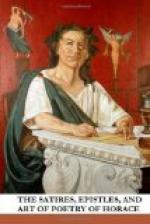“I’ll hear the details from himself: go say
I’ll thank him if he’ll sup with me to-day.”
Mena can scarce believe it; posed and mum
He ponders; then, with thanks, declines to come.
“What? does he dare to say me nay?” “Just so;
Be it reserve or disrespect, ’tis no.”
Philip next morn finds Mena at a sale
“Where odds and ends are going by retail,
And greets him first. He, stammeringly profuse,
Alleges ties of business in excuse
For not by day-break knocking at his door,
And last, for not observing him before.
“Well, bygones shall be bygones, if so be
You’ll come this afternoon and sup with me.”
“I’m at your service.” “Then ’twixt four and five
You’ll come: now go, and do your best to thrive.”
He’s there in time; what comes into his head
He chatters, right or wrong; then off to bed.
So, when he’d learnt to nibble at the bait,
At levee early and at supper late,
One holiday he’s bidden to come down
With Philip to his villa out of town.
Astride on horseback, both, he vows, are rare,
The Sabine country and the Sabine air.
Philip looks on and chuckles, his one aim
To get a laugh by keeping up the game,
Lends him seven hundred, gives him out of hand
Seven more, and leads him on to buy some land.
’Tis bought: to make a lengthy tale concise,
The man becomes a clown who once was nice,
Talks all of elms and vineyards, ploughs and soil,
And ages fast with struggling and sheer toil;
Till, when his sheep are stolen, his bullock drops,
His goats die off, a blight destroys his crops,
One night he takes a waggon-horse, and sore
With all his losses, rides to Philip’s door.
Philip perceives him squalid and unshorn,
And cries, “Why, Mena! surely you look worn;
You work too hard.” “Nay, call me wretch,” says he,
“Good patron; ’tis the only name for me.
So now, by all that’s binding among men,
I beg you, give me my old life again.”
He that finds out he’s changed his lot for worse,
Let him betimes the untoward choice reverse:
For still, when all is said, the rule stands fast,
That each man’s shoe be made on his own last.
VIII. TO CELSUS ALBINOVANUS.
Celso GAUDERE.
Health to friend Celsus—so, good Muse,
report—
Who holds the pen in Nero’s little court!
If asked about me, say, I plan and plan,
Yet live a useless and unhappy man:
Sunstrokes have spared my olives, hail my vines;
No herd of mine in far-off pasture pines:
Yet ne’ertheless I suffer; hourly teased
Less by a body than a mind diseased,
No ear have I to hear, no heart to heed
The words of wisdom that might serve my need,
Frown on my doctors, with the friends am wroth
Who fain would rouse me from my fatal sloth,
Seek what has harmed me, shun what looks of use,
Town-bird at Tibur, and at Rome recluse.
Then ask him how his health is, how he fares,
How prospers with the prince and his confreres.
If he says Well, first tell him you rejoice,
Then add one little hint (but drop your voice),
“As Celsus bears his fortune well or ill,
So bear with Celsus his acquaintance will.”




